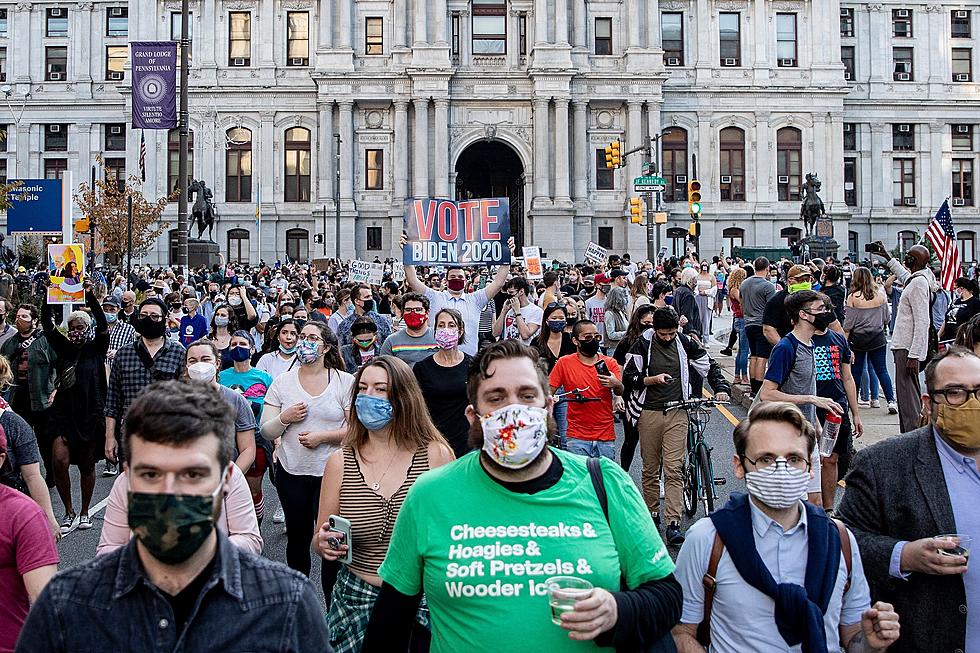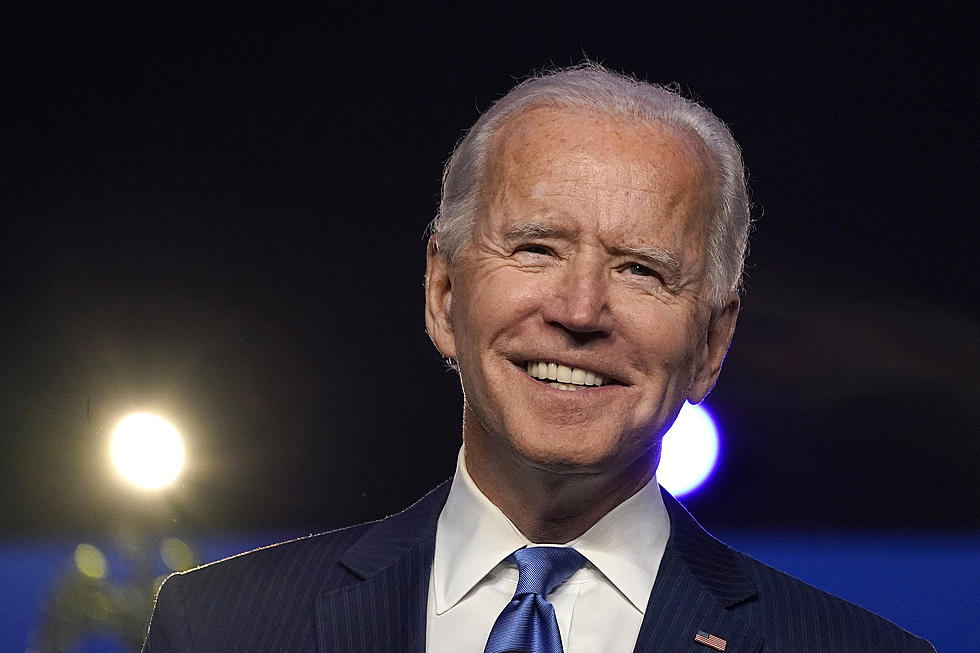
Every single NJ county backed marijuana. What happens next
It's not just that voters turned out in New Jersey to support legal marijuana. It's that it wasn't even close.
Tallies by Wednesday morning showed 1,735,733 voters told the New Jersey legislature to make recreational marijuana legal for adults through a constitutional amendment, with 63 percent of precincts reporting — "yes" represented 67 percent of the vote. Just 857,073 said no. While votes continue to come in — mail-in ballots can be received until Nov. 10, and provisional ballots cast at the polls won't be counted until the same day — it's clear the referendum sailed to an easy win.
Not only that: It dominated. "Yes" votes won by wide margins in every single county in New Jersey, even in the most conservative corners of the state. In blue Hudson County, yes-to-marijuana received more votes than Democratic Presidential contender Joe Biden. It was the state's most lopsided victory for pot — about 198,000 to 41,000, as of late-night tallies, or 82 percent of the vote.
In Essex, Mercer and Camden counties, "yes" had in excess of 70 percent of the vote. Unofficial tallies had it with a hair less than 60 percent only in Ocean County, the area of the state that most enthusiastically went for President Donald Trump this year.
“This isn’t a partisan issue. That’s the beautiful part about this," Bill Caruso, head of the cannabis law division of the Archer law firm, told New Jersey 101.5's Eric Scott Tuesday night. "There’s something for everybody here. Even for people who aren’t going to avail themselves of adult use marijuana, if you believe that a person who was convicted of a crime of marijuana possession in their 20s shouldn’t have a life sentence from employment restrictions going forward, this is for you.
"If you think we should be benefiting from tax revenue and putting it behind regulated store counters, this is for you," Caruso said.
He said New Jersey benefits from the path other states have forged on the issue — learning their lessons without waiting for the federal government to eventually legalize marijuana and set the rules of the marketplace. Marijuana distribution and possession remain illegal under federal law.
But don't light up in celebration yet, legalization fans. There's a lot of work to be done.
The vote authorizes a constitutional amendment to allow adult-use recreational marijuana. How New Jersey goes about making it real will depend on enabling legislation.
"What began as a mission to bring reform to our criminal justice system and progress to New Jersey has finally become an inescapable reality for my colleagues in the Legislature," state Sen. Nicholas Scutari said in a statement sent to media late Tuesday night. The senator has written a bill that will be used as a basis for draft legislation. "Credit is due entirely to voters in this state who, after weighing the apprehension expressed by some politicians, courageously declared that our society is ready for a regulated and safe cannabis industry in New Jersey.
He said he's ready to work with fellow legislators — and Gov. Phil Murphy, who campaigned on legalization but couldn't reach an agreement with legislators to see it happen until now: "This is a win for our communities of color, for fairness, and for common sense."
New Jersey could be several months away from seeing legal sales. Its current state budget doesn't depend on any tax revenue from marijuana. Most industry watchers expect the state's existing 12 medical marijuana dispensaries, which are already licensed, to put recreational pot up for sale first.
Legislators will have to navigate resistance from local communities. As of last month, there were nearly 70 local ordinances banning either all marijuana sales and growth or recreational forms of the drug.
And there are voices from all corners looking to be heard as legislation moves ahead.
Diane Calello, executive medical director of New Jersey Poison Control Center at Rutgers New Jersey Medical School, said safety should be the state's highest priority: “Responsible packaging, commerce and surveillance can prevent unintended consequences. A detail-oriented approach is essential – let’s get it right the first time around.”
Sayreville Police Chief John Zebrowski told New Jersey 101.5 last month that while drunk-driving crashes are down significantly over the last 30 years, he worried that the marijuana legalization would lead to more impaired drivers. He also said the change would bolster, not destroy, the black market of illegal drugs.
“It’s very difficult to undercut (a black market) that can always reduce the price and increase the potency because they don’t have the same checks and balances that a state-regulated dispensary would have,” Zebrowski said.
Zebrowski said there’s no way to measure drugged driving comparable to the tools used for alcohol, and that there aren’t enough drug-recognition experts on police forces.
But Chris Beals, chief executive officer of Weedmaps, said increased danger on the road is a myth that hasn't borne out in other states.
“There are multiple studies that there is no increase in car accidents or car fatalities post-legalization," Beals previously said.
As the lopsided nature of the vote Tuesday night became clear, advocates repeated a demand that's been core to their message — that enabling legislation aid poor communities and communities of color.
“Unjust racial disparities have for decades defined enforcement of marijuana laws, and we must make sure that we now do everything in our power to ensure that racial justice defines legalization," ACLU-NJ Executive Director Amol Sinha said Tuesday night.
Sinha said the "yes" vote was only a "first step toward justice."
“Importantly, legislators must also pass legislation to decriminalize cannabis immediately to stop unjust cannabis-related arrests from harming more people in the interim period before legalization is fully implemented," Sinha said.
He called for "robust" expungement of records and work to create an "inclusive, racially just, equitable cannabis industry"
Advocates have criticized previous measures intended to legalize marijuana for excluding people with past convictions — including for pot — from participating in the legal marketplace. They say that disproportionately rules out minorities from benefiting.
The pro-legalization NJ CAN 2020 campaign Tuesday echoed the calls for social justice and racial equity in any legislation, "to deliver the economic benefits and improved public safety to follow from the new law.”
Sinha told New Jersey 101.5 Tuesday night it's important the legal market is "not just reserved for millionaires backed by mega corporations."
Scott Rudder, head of the New Jersey CannaBusiness Association, said Tuesday he wants to see the legislature remove "potential restrictions that could keep the industry from reaching its full potential."
"But we will take that argument up tomorrow. For now, we will enjoy this moment for all that it is worth," he said.
Daniel Bowen, chair and associate professor of political science at the College of New Jersey, told New Jersey 101.5 the marijuana question is one that's seen generational change.
"We’ve seen pro-marijuana legislation being passed over the past 20 years. It’s here because the majority of the public wants it and you’re seeing that in the referendum results.”
Anticipating the measure would pass, opponents Smart Approaches to Marijuana released a statement from their president, Dr. Kevin Sabet, mid-Tuesday:
"This result is disappointing, but not surprising, given that the No campaign was outspent about 400 to 1. After spending at least $4 million lobbying lawmakers, Big Pot spent another $2 million to hoodwink voters into allowing its expansion. This investment may pay dividends for the industry, but it will not pay off for those who will suffer as a result of increased substance use disorders, drugged driving, and poorer educational outcomes and economic opportunities.
"But we are not done. I believe most people probably thought they were decriminalizing – not necessarily legalizing – marijuana. You will see some of the same people who voted for this will stand with us to stop pot shops in their communities. They will also stand with us as we pressure the legislature into making regulations that can at least partially protect public health.
"We will continue to work with those who have been with us since the start to monitor and expose New Jersey’s marijuana industry at every turn. The fight for public health and safety is never over.”
NJ COMMUNITIES OPPOSING MARIJUANA:
Allendale (Bergen County) An ordinance approved in Sept. 2018 bans sales, cultivation, distribution manufacturing or testing of recreational marijuana, as well as retail "social clubs."
Barnegat (Ocean County) — A July 2018 ordinance bans any sales, manufacturing, growing, cultivating, or any farming activities related to marijuana.
Berkeley (Ocean County) — A February 2018 ordinance bans the sale of marijuana and paraphernalia across the entire township.
Brick (Ocean County) — The Township Council voted March 12 to adopt an ordinance that bans sales, cultivation, manufacturing or testing of recreational marijuana.
Bridgeton (Cumberland County) — In November 2018, voters narrowly opposed allowing marijuana businesses from operating in their city in a pair of non-binding referendum questions. When asked "Should Bridgeton allow retail facilities of recreational marijuana to operate within city limits?" 1,211 of respondents said "yes," while 1,250 said "no." As for the ballot question "Should Bridgeton allow operation of facilities that cultivate and/or distribute to retail facilities of recreational marijuana within city limits?" 1,186 voters said "yes," while 1,231 said "no."
Bridgewater (Somerset County) — A September 2018 ordinance bans the sale, cultivation, manufacturing and testing of recreational marijuana within the township.
Brigantine (Atlantic County) — A June 2018 ordinance bans the sale of recreational marijuana and/or paraphernalia.
Carlstadt (Bergen County) — A May 2018 ordinance bans recreational marijuana sales and growth. NorthJersey.com reported Mayor Craig Lahullier said: “We aren’t against medical use. If a company comes in and wants to do a warehouse, as long as they follow the law, we’re not going to fight that."
Chatham Township (Morris County) — An April 2018 ordinance bans marijuana cultivation, production or manufacturing, testing and retail stores across the township.
Chester Township (Morris County) — A November 2018 ordinance bans growing, processing or selling marijuana within the township.
Clifton (Passaic County) — A September 2018 ordinance bans the cultivation, manufacture, warehousing, distribution and sale of marijuana or any derivative or synthetic form of marijuana, "except medical marijuana prescribed by a licensed practitioner and dispensed by a licensed practitioner."
Colts Neck (Monmouth County) — An August 2018 ordinance bans the growing, cultivating, farming, manufacturing, distribution, or selling of medical and/or recreational marijuana.
Cranbury (Middlesex County) — A March 2018 ordinance bans the selling and growing of recreational marijuana in the township.
East Rutherford (Bergen County) — A July 2018 ordinance bans cultivation, manufacturing, warehousing, distribution and sale of recreational marijuana.
Elmwood Park (Bergen County) — An October 2018 ordinance bans all recreational marijuana sales.
Emerson (Bergen County) — An August 2018 ordinance bans all sales or growing of recreational or medical marijuana.
Fair Haven (Monmouth County) — A May 2018 ordinance bans recreational marijuana sales and growing, while allowing for the possibility of medicinal dispensaries within the borough.
Franklin Lakes (Bergen County) — A June 2018 ordinance bans the selling and growing of recreational marijuana, noting the legal exception of "medical marijuana prescribed by a physician and dispensed by a licensed pharmacist."
Freehold Township (Monmouth County) — An October 2018 ordinance bans on recreational and medical marijuana growing and sales.
Garfield (Bergen County) — A February 2018 ordinance bans the sale of marijuana within municipal limits.
Harding (Morris County) — A September 2018 ordinance bans the sale, cultivation, production and manufacturing of marijuana "whether for medicinal or recreational purposes."
Hasbrouck Heights (Bergen County) — A February 2018 ordinance bans recreational marijuana sales, while noting the legal exception for "the sale of medical marijuana having been prescribed by a licensed physician and dispensed by a licensed pharmacist."
Hawthorne (Passaic County) — A March 2018 ordinance bans the sale of medical and recreational marijuana within the borough.
Hazlet (Monmouth County) — A February 2018 ordinance bans the sale and growing of both recreational and medical marijuana.
Highlands (Monmouth County) — A resolution introduced in March 2019 announced intentions to ban the sale of recreational and medical marijuana.
Ho-Ho-Kus (Bergen County)
The borough in Oct. 2018 passed an ordinance that bans all cannabis shops and/or retailers.
Jamesburg (Middlesex County) — A September 2018 ordinance bans the sale and growth of recreational and medical marijuana.
Lacey (Ocean County) — As of October, the township has amended an ordinance to ban the sale, resale, purchase, acquisition, distribution and dispensation of marijuana and marijuana paraphernalia, "notwithstanding any non-preemptive federal or state law to the contrary." The ordinance does not apply to the medical use of marijuana."
Lodi (Bergen County) — A June 2018 ordinance bans the cultivation, manufacturing, processing, warehousing, distribution and sale of marijuana, both medical and recreational.
Lumberton (Burlington County) — The township passed an ordinance in October 2018 that bans retail sales of marijuana, while allowing “cultivation, manufacturing and distribution activities as a conditional use in the township’s three industrial zoning districts,” as reported by Burlington County Times.
Mahwah (Bergen County) — A June 2018 ordinance bans all marijuana retail establishments, dispensaries, cultivation facilities and manufacturing plants.
Mannington (Salem County) The township passed an ordinance in February that bans all marijuana-related land use and development, including retail sales.
Manville (Somerset County) — A May 2018 ordinance bans the sale of both recreational and medicinal marijuana.
Midland Park (Bergen County) — A May 2018 ordinance bans the sale of marijuana, while noting the legal rights of residents authorized to use medical marijuana.
Montvale (Bergen County) — In August 2018, the borough adopted an ordinance to ban marijuana retail establishments, dispensaries, cultivation facilities and manufacturing plants. It does not apply to selling legally prescribed medical marijuana.
North Caldwell (Essex County) — A February 2018 ordinance bans the growth or sales of recreational marijuana.
North Haledon (Passaic County) — A February 2018 ordinance bans the growth or sales of recreational marijuana.
Oakland (Bergen County) — A November 2018 ordinance bans recreational marijuana sales, cultivation, manufacturing, testing, delivery, dispensing and distribution, while legally exempting "medical marijuana use, dispensaries and caregivers."
Oceanport (Monmouth County) — An April 2018 ordinance bans the growth or sale of medicinal or recreational marijuana.
Old Bridge (Middlesex County) — An April 2018 ordinance bans selling, distributing, cultivating, growing and/or facilitating the use of recreational or medicinal marijuana.
Old Tappan (Bergen County) — A November 2018 law bans recreational and medical marijuana sales.
Palisades Park (Bergen County) — A September 2018 law bans medicinal and recreational marijuana sales.
Parsippany-Troy Hills (Morris County) — A March 2018 resolution strongly opposes marijuana legalization.
Pleasantville (Atlantic County) — An August 2018 ordinance bans the sale of recreational marijuana. But the municipality approved plans for a medical marijuana dispensary in the community.
Point Pleasant Beach (Ocean County) — A December 2017 ordinance bans businesses from selling medicinal and recreational marijuana.
Ramsey (Bergen County) — A February 2018 ordinance bans all marijuana sales.
Ridgewood (Bergen County) — An October 2018 ordinance bans all marijuana sales.
Rumson (Monmouth County) — A March 2018 ordinance bans the sale or growth of medical or recreational marijuana.
Saddle Brook (Bergen County) — A September 2018 ordinance bans recreational marijuana sales, cultivation, manufacturing and testing facilities.
Saddle River (Bergen County)
The borough adopted an ordinance in Oct. 2018 that bans sales, cultivation, manufacturing and testing facilities for either recreational or medical marijuana.
Sea Girt (Monmouth County) — A March 2018 ordinance bans marijuana sales and growth in the community.
Seaside Heights (Ocean County) — The borough council passed an ordinance in effect since May, banning the sale, cultivation, manufacturing, testing facilities, social clubs and overall use regarding recreational marijuana.
Secaucus (Hudson County) — An August 2018 ordinance bans the sale, growth and distribution of recreational marijuana "in the interest of public safety."
Shrewsbury (Monmouth County) — An October 2017 ordinance bans medical marijuana facilities. No ordinance yet on recreational marijuana.
Somers Point (Atlantic County) — A Dec. 2018 city ordinance bans the sale of recreational marijuana.
Spotswood (Middlesex County) — A February 2018 resolution passed by the Borough Council strongly opposed marijuana legalization.
Surf City (Ocean County) — A March 2018 ordinance bans the local sale, distribution and growth of marijuana.
Union City (Hudson County) — A February 2018 ordinance bans the operation of facilities that cultivate, manufacture, test, or sell marijuana within the community.
Upper Pittsgrove (Salem County) — An ordinance passed in November 2018, banning marijuana cultivation, production, manufacturing and sales in the township.
Upper Saddle River (Bergen County) — A June 2018 ordinance bans the sale and growth of marijuana and related products.
Waldwick (Bergen County) — A zoning ordinance adopted in October 2018 bans the sale of marijuana and paraphernalia. It does not apply to selling legally prescribed medical marijuana.
Wall (Monmouth County) — A February 2018 ordinance bans marijuana growing and sales, both recreational and medical.
Wayne (Passaic County) — A September 2018 ordinance bans the sale and distribution of marijuana in the township.
Weehawken (Hudson County) — A February 2018 ordinance bans the commercial sale, growth, distribution, and use of marijuana in retail/commercial establishments
West Caldwell (Essex County) — A September 2018 ordinance bans recreational marijuana sales and growth.
West Long Branch (Monmouth County) — A June 2018 ordinance bans the sale and growth of marijuana.
Westwood (Bergen County) — An October 2018 ordinance banned all marijuana sales but it was vetoed by the mayor, who wanted to pursue medical marijuana.
Woodcliff Lake (Bergen County) — A June 2018 ordinance bans all marijuana sales and growth.
Wyckoff (Bergen County) — A July 2018 ordinance bans marijuana sales, except for medical use "by prescription and dispensed by a licensed pharmacist."
— With reporting by Dan Alexander, Erin Vogt, Michael Symons, Eric Scott, Sergio Bichao and Louis C. Hoch,an
READ MORE: New Jersey's Cutest Pets of 2020
More From 94.5 PST










